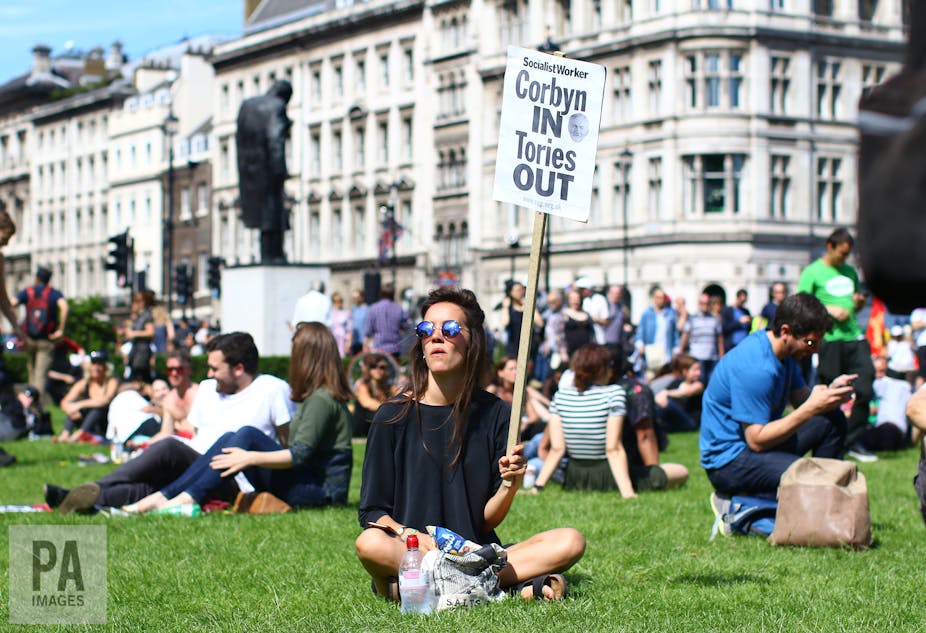It’s not easy being a professor of politics. Everyone expects me to know what’s going on and what’s going to happen. But I’m just as bamboozled as everyone else by the outcome of the UK’s recent general election.
“Bamboozlement” has become something of a byword for modern democratic events. Think Brexit, think Donald Trump, and now think “Corbyn the conqueror” – the unlikely cult hero leading an “old” political party re-designated as a grassroots social movement.
To some extent, recent events in the UK are symptomatic of a broader international trend that is often (but incorrectly) labelled as anti-political sentiment. But high levels of social frustration and political disengagement among large sections of the public actually veils a desire for a different kind of politics – not the denial or rejection of democratic politics itself.
It is this that explains the growth of populist nationalism (on both the right and left) in Europe and the United States. It also helps explain what happened on June 8 2017.
The success of Jeremy Corbyn and his “New-Old” Labour party was that it tapped into and funnelled the large reservoir of social frustration with politics. Corbyn offered a very different type of politics, both in terms of content (a clear shift to the left of higher taxes and nationalisation) and form (against the clean-cut image of “professional politicians”). Corbyn’s rather chaotic and almost amateurish approach came across as refreshingly honest. Never before have a scruffy beard and an untucked shirt become such electoral assets.
If you are anti-political (against how politics generally works), if you are anti-politician (against politicians who all look and behave the same), and if you are anti-establishment (in terms of believing in the existence of a largely untouchable political elite), then the Labour party under Corbyn positioned itself like a political lightning-rod to channel those frustrations.
This is the key point that many of his opponents failed to understand. The more the media attacked and mocked him, the more Theresa May refused to engage, the more Boris Johnson described the Labour leader as a “benign herbivore” and a “mutton-headed mugwump” the more this seemed to energise and build Corbyn’s support base. It simply confirmed in the minds of the disaffected just how brash and arrogant the political elite had become.
Funnelling frustration and offering a positive message formed the magic formula for the Labour Party’s glorious defeat. It tuned into the populist signal.

The critical element, however, which offers a key to understanding contemporary democracy, was the manner in which the Labour party secured the support of at least three very different segments of the previously disillusioned or disengaged.
The first segment was the traditionally anti-political youth (aged 18-24) who were dismissed as “snowflake voters” who would melt away before getting to the polling booth. The pollsters were wrong. (Again.). Around 72% of younger voters ended up placing their crosses on the ballot paper (up from just 44% in 2015).
Many young people are still angry about the EU referendum vote and joined a second section of the public who were, put simply, anti-hard Brexit. This included remainers and soft-Brexiteers, but the common denominator was deep-seated concern about the increasingly belligerent, nationalist and aggressive tone of the Conservative Party.
This in turn leads to the third and final group – the white working classes, the “left behind”, who rejected mainstream politics and led “the revolt on the right” seen in the popularity of UKIP in 2015. The simple fact seems to be that a large proportion of the “left behind” went back to the left. They chose to support an anti-austerity agenda and investment in public services above the anti-immigrant anti-Europe stance offered by the Conservatives.
The times they are a-changin’
It seems then, in this bamboozling aftermath of June 8, that the public is not anti-political. They are “pro-political” but also “pro-a-different-way-of-doing-politics”. They crave the existence of real policy choices and a positive vision for the future.
As I argue in my new book, What Kind of Democracy is This?, the concept of democracy is in flux, and arguably more fragile than at any point in the last 50 years. Politicians need to be popular, but this is different to falling into the trap of populism (the very opposite of democratic politics). Populists tend to offer simple solutions to complex problems, generally by blaming “the problem” on a specific section of society (immigrants, foreigners, gypsies …), and then arguing that if we “the people” could only get rid of the cumbersome safeguards of democracy, life would be so much easier.
“Let the people govern” is a phrase often used to veil the imposition of centralised and unaccountable structures. Democracy has to have limits, but populists tend to deny this basic fact.
For many, Brexit, President Trump, and Corbyn’s 40% vote share have come as a series of political surprises. The rules of the political game have changed but nobody seems to know quite what they are anymore.
We need a new language of politics in order to fully grasp what kind of democracy this is. The language of left or right, for or against, in or out is the language of simple binaries or zero sum games. It no longer reflects a changing world of multiple and overlapping loyalties and identities. Most of all we need a language of politics that rejects the dominant politics of pessimism and offers in its place a bold new vision of collective action and self belief – a new politics of optimism to underpin a new kind of democracy.

